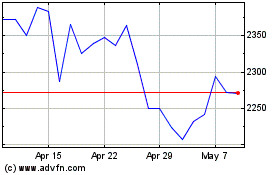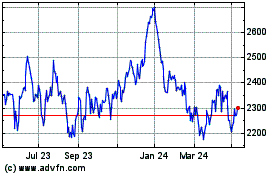BHP-Elliott Feud Sharpens -- WSJ
May 26 2017 - 3:02AM
Dow Jones News
Mining company's oil-and-gas holdings are at center of quarrel
with activist
By Scott Patterson and Robb M. Stewart
LONDON -- The clash between BHP Billiton Ltd. and activist hedge
fund Elliott Management Corp. is narrowing to one issue that could
determine the future of the Anglo-Australian mining giant: Should
BHP remain in the oil-and-gas business?
Elliott urged BHP to launch an independent review of its entire
petroleum division last week, after calling for a broad
restructuring of BHP last month that would include a spinoff of its
U.S. petroleum business. It argues that BHP's cash would be better
spent on its "world-beating" mining assets than its struggling
American shale holdings and oil rigs in the Gulf of Mexico.
BHP has countered to Elliott and others that its knowledge of
geology makes it better positioned to explore shale drilling than
big oil companies, according to people familiar with the matter.
Its executives have said it spends more time studying the rock
formations and has been more productive than wildcatters at
striking wells, which will pay off in coming years, the people
said.
Neither side appears prepared to back down in a clash that will
likely play out for months.
While BHP, the world's largest mining company by value, has
conceded it made missteps investing billions in U.S. shale assets
at the height of the natural-gas boom -- moves that have led to
billions in write-downs -- it shows little sign of giving in to
Elliott's demands. BHP Chief Executive Andrew Mackenzie has brushed
off Elliott's proposals as little more than "financial
engineering."
Elliott, which said it holds a 4.1% stake in BHP's London shares
and is fresh off a high-profile win after helping to unseat Arconic
Chief Executive Klaus Kleinfeld, is also sticking to its guns. The
hedge fund, which manages nearly $33 billion, has valued a spinoff
of BHP's U.S. oil business at $22 billion. It says BHP's management
has adopted a "do-nothing approach" to its problems and called its
responses to the hedge fund's proposals "dismissive" and
"misleading."
Some investors say they are pleased BHP is being pressed to
review its petroleum stake. Brenton Saunders, a portfolio manager
at BHP investor BT Investment Management in Sydney, said
shareholders have long held concerns about BHP's oil-and-gas
assets. The emergence of activist investors calling for changes has
encouraged healthy debate, and it is clear that BHP is taking it
seriously, he said.
Other investors say BHP has been responsive to questions about
the oil-and-gas business and are awaiting further details.
"We're engaged with BHP, and we're sure they are reviewing the
situation, " said Fidelis Madavo, an executive at Public Investment
Corp., South Africa's state-run pension fund and one of BHP's
largest investors, with more than $1 billion in shares, according
to FactSet. "We know the U.S. shale assets have been a problem," he
said.
Though the company and the hedge fund have now been squabbling
for nine months, "everything triangulates back to oil and gas,"
said Paul Gait, a Sanford C. Bernstein analyst who has argued that
BHP should rid itself of its entire petroleum business, including
its Australian operations.
One path Elliott could choose would be to try to take its plans
directly to a future shareholder meeting if BHP isn't responsive, a
person familiar with the fund's plans said. BHP's annual meeting in
London is in October.
It is rare for mining companies to own substantial oil-and-gas
operations. Glencore PLC owns oil assets in Equatorial Guinea and
Chad, but they are small relative to the miner's other
businesses.
BHP said its oil-and-gas business provides for a more
diversified portfolio. Moody's Investors Service, which in May
boosted BHP's ratings outlook to positive from stable, said it
views the mining giant's oil-and-gas business as "strengthening its
diversification relative to other global miners."
Mr. Mackenzie has said the oil-and-gas operations are a good fit
with the company's strategy, noting that in the last five years
they were its highest-margin operation, with average underlying
earnings before interest, taxes and depreciation of 66%.
In a presentation at a conference in Barcelona last week ahead
of a meeting with Elliott officials, Mr. Mackenzie, who previously
worked for oil titan BP PLC, said the petroleum business is core to
BHP's growth plans, but acknowledged that the company had overpaid
to build a position in U.S. shale.
But some investors are growing restless, including Australian
fund manager Tribeca Investment Partners, which recently met with
Elliot and earlier this month called for BHP to divest its U.S.
onshore oil-and-gas assets, a move it estimates would bring in
about $10 billion that could be reinvested or returned to
shareholders.
"We both see a lot of value that isn't being realized," said
Tribeca analyst James Eginton.
David Benoit contributed to this article.
Write to Robb M. Stewart at robb.stewart@wsj.com
(END) Dow Jones Newswires
May 26, 2017 02:47 ET (06:47 GMT)
Copyright (c) 2017 Dow Jones & Company, Inc.
Bhp (LSE:BHP)
Historical Stock Chart
From Mar 2024 to Apr 2024

Bhp (LSE:BHP)
Historical Stock Chart
From Apr 2023 to Apr 2024
